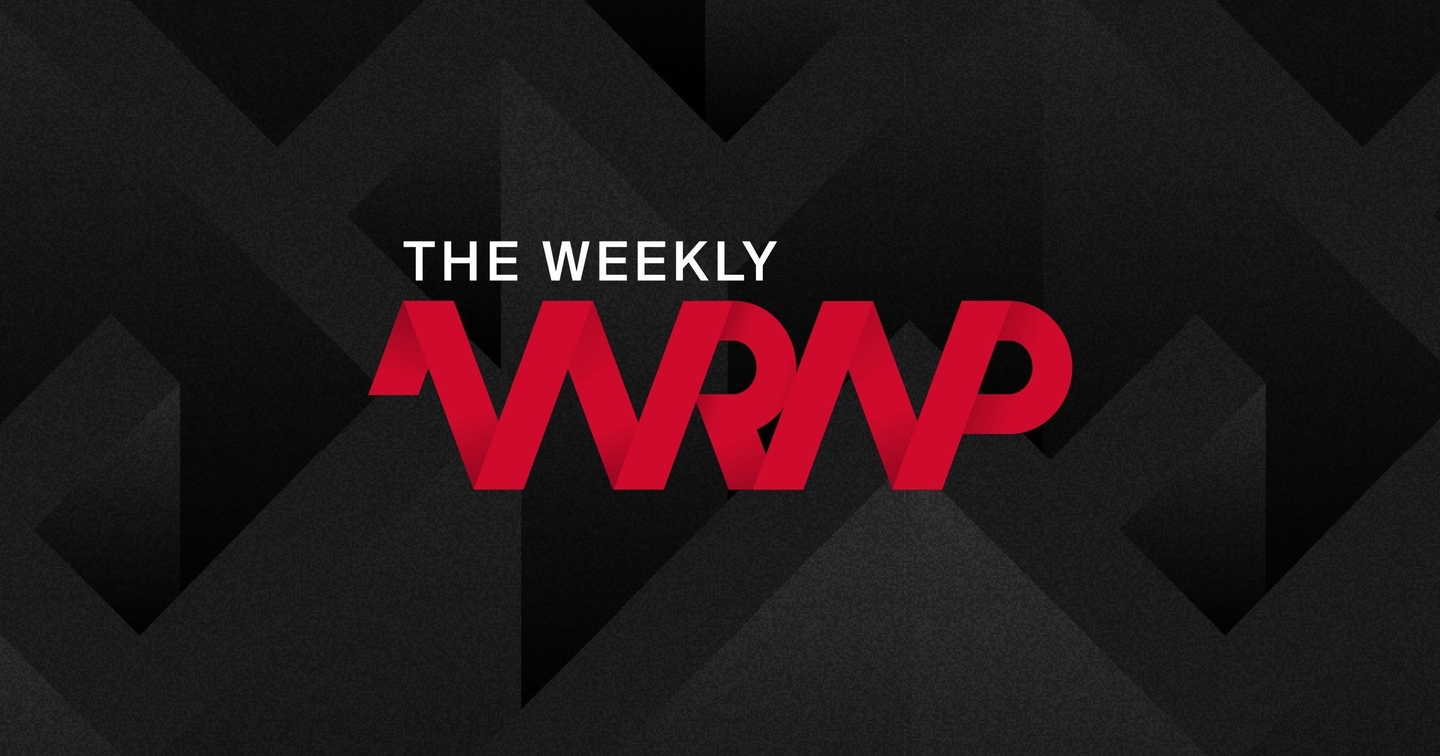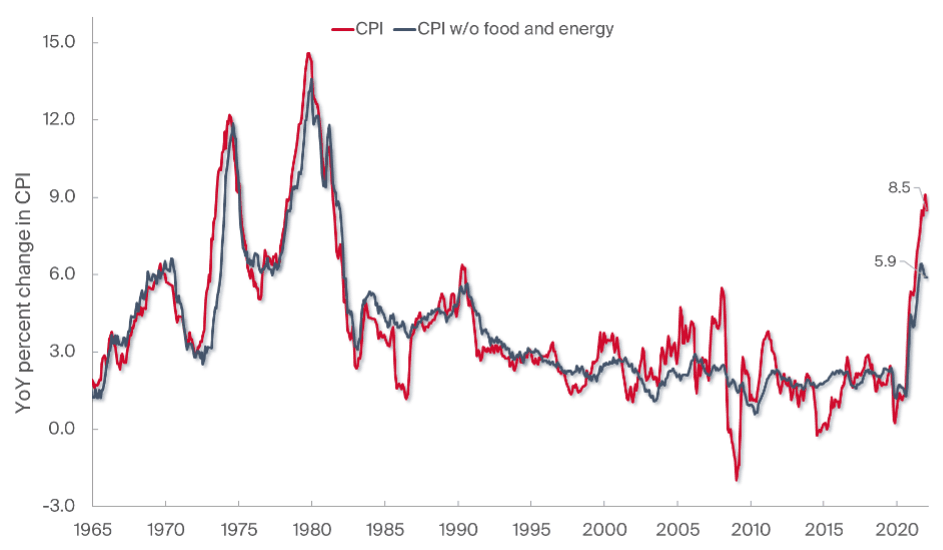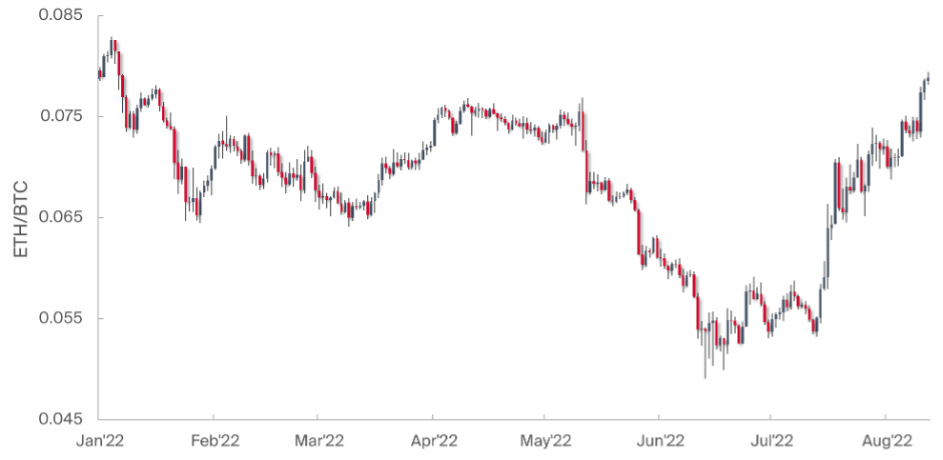
Dominic WeibelHead of Research, Bitcoin Suisse
The Weekly Wrap: U.S. July CPI, Goerli merges with Prater, Tornado Cash sanctioned
Aug 12, 2022 - 4 min read

1. U.S. July CPI cools down along with unexpected job growth
The Facts:
- The YoY U.S. CPI of July slowed down to 8.5%, 0.2% lower than the estimate of 8.7% and 0.6% lower than previous month’s rise of 9.1%, as energy costs slumped along retail discounting, the return of online deflation and a plunge in shipping costs.
- Core U.S. CPI, excluding food and energy, rose 0.3% MoM (estimated at 0.5%) and 5.9% (estimated at 6.1%) YoY in June, on par with previous month’s YoY core CPI.
- The dollar showed signs of weakness as it recorded its highest decline in five months following the report.
- Meanwhile, CPI in China hit a new two year high of 2.7% YoY in July induced by accelerating food prices.
- After last week’s promising job growth metrics, the report provided more good news for employees, whose monthly real salaries increased by 0.5%.
Why it’s important:
- As the CPI of July came in cooler than anticipated, the inflation rate finally decreased from its recent 40-year peak on the back of slowed down consumer demand and crumpled supply-chains impacted by Covid and macro conditions being ironed out.
- One must be careful to not overstate the decelerating inflation resulting from energy prices as it remains abnormally high while wage is growing alongside sticky housing costs.
- However, the inflation rate cool-off might lower the odds of a big rate hike at the FED’s next meeting in September even if the strong nonfarm payrolls seem to allow continued tightening monetary policy.
- Another tool to curb inflation passed the Senate on Sunday, the Inflation Reduction Act, a $700b package aimed to lower energy and health care cost.

$5.17b vs. $6.69b
Aggregate open interest of Bitcoin Options and Ether Options
2. Goerli successfully merges with Prater
The Facts:
- On Thursday, Goerli merged successfully with its beacon chain Prater, the third and final big test network environment after Ropsten and Sepolia.
- The testnet transition was not without hiccup, as some nodes got stuck on the wrong chain, yet the chain finalized eventually.
- Following the successful completion of the Goerli Testnet, the Merge was tentatively scheduled at a Terminal Total Difficulty (TTD) of block 58750000000000000000000, estimated to happen between September 13-16.
Why it’s important:
- As this was the very last testnet merge of the longest running beacon chain testnet to date, this is the most important testnet merge to date.
- Goerli’s PoS transition finally happened after a long series of merging several testnet environments, among them Rayonism, Amphora, Kintsugi, Kiln, Goerli shadow forks 1-4, mainnet shadow forks 1-8, Merge devnets 1-6, Ropsten and Sepolia.
- The next PoS transition happening next will be the actual Merge scheduled for September, being one of the most significant catalysts in Ethereum history as it impacts the network on several fronts.
- Interestingly, the mainnet Merge will bring down Ethereum’s daily network issuance that started back in 2015 at 26k ETH under PoW to 1.7k ETH post-merge.
- The approaching merge already started to drive momentum towards ETH, indicated by ETH-BTC, but also other connected assets such as liquid staking tokens while investors look to get the best possible exposure towards the event.
- While PoW hard forks are in the books and “airdrop farming” might be a thing, Chainlink, FTX and Circle already announced that they will only support the PoS chain.

I think the next 10 years is when crypto has to transform into something that is not based on promises of being useful in the future but is actually useful, because a lot of applications are promising in theory, but they’re just completely not viable because of scaling issues today.
Vitalik Buterin, Co-Founder of Ethereum on scalability and adoption of crypto (via Timestabloid)
3. U.S. Treasury blacklists Tornado Cash
The Facts:
- The U.S. Treasury sanctioned crypto mixer Tornado Cash on Monday for aiding thieves in laundering of stolen money, after a similar service, Blender.io, was sanctioned in May.
- Tornado Cash is a privacy protecting crypto mixer running on Ethereum that enables users to send and receive digital assets anonymously.
- 44 smart contract addresses linked to Tornado Cash were thus added to the Specially Designated Nationals list (SDN) maintained by the Office of Foreign Assets Control (OFAC), a watchdog organization responsible for preventing sanctions violations.
- By that, all U.S. persons and entities are banned from using the decentralized mixer platform.
- Along with the U.S. sanctions, Netherlands’ Fiscal Information and Investigation Service (FIOD) arrested a developer suspected of involvement in Tornado Cash on Friday in Amsterdam.
- FIOD that is investigating since June did not rule out further arrests and stated that it is giving “extra attention” towards DAOs.
Why it’s important:
- By sanctioning Tornado Cash, the Treasury is targeting an immutable smart contract, a piece of software as opposed to individuals.
- The news, that might also trigger that mixers will be perceived as high-risk under the upcoming EU regulation, were highly criticized within the crypto community, judging it as a “freedom of speech issue and bad precedent”.
- As sanctions are a strict liability regardless of intent, honest users trying to protect their privacy while using the mixer for legitimate reasons might be affected as well.
- For instance, shortly after the news were released, notable celebrities‘ addresses received ETH from government sanctioned Tornado Cash wallets, including Jimmy Fallon, Shaquille O’Neal, Dave Chappelle and others.
- As a result of the blacklisting, Circle froze $75,000 of USDC linked to addresses sanctioned by the OFAC.
- Following the press release, dYdX, a decentralized order book exchange for perpetual trading, also blocked user accounts that had previously interacted with Tornado Cash.
- Aside from that, infrastructure providers Infura and Alchemy started blocking RPC requested towards Tornado Cash, rendering the platform inaccessible.
- Additionally, the sacntions not only exposed the lack of censorship resistance of centralized stablecoins such as USDC and USDT but also the contagion of stablecoins that are supposed to be decentralized such as DAI yet hold centralized non-permissionless stablecoins as collateral.
- Only fully decentralized projects such as Liquity with fully decentralized front-ends, ETH as sole collateral and immutable smart contracts w/o governance might offer a viable permissionless and censorship resistant solution to the polarizing move of the Treasury.
In other news
- Vitalik Buterin proposes low tech privacy approach for NFTs (via ethresear.ch)
- Next CeFi platform Hodlnaut halts withdrawals (via Reuters)
- BlackRock launches private trust offering spot Bitcoin exposure to U.S. institutional clients (via Reuters)
- Curve Finance suffers $612k frontend hack (via Decrypt)
- Arbitrum’s Offchain Labs launches gaming and social application optimized Nova (via Offchain Labs)